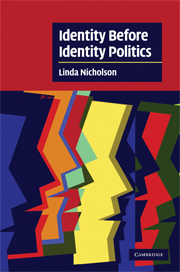Book contents
- Frontmatter
- Contents
- Acknowledgements
- Introduction
- 1 The politics of identity: race and sex before the twentieth century
- Introduction to chapters 2 and 3
- 2 Freud and the rise of the psychological self
- 3 The culture concept and social identity
- Introduction to chapters 4 and 5
- 4 Before Black Power: constructing an African American identity
- 5 Womem's identity/women's politics
- Epilogue: identity politics forty years later: assessing their value
- Index
- Cambridge Cultural Social Studies
Introduction
Published online by Cambridge University Press: 17 July 2009
- Frontmatter
- Contents
- Acknowledgements
- Introduction
- 1 The politics of identity: race and sex before the twentieth century
- Introduction to chapters 2 and 3
- 2 Freud and the rise of the psychological self
- 3 The culture concept and social identity
- Introduction to chapters 4 and 5
- 4 Before Black Power: constructing an African American identity
- 5 Womem's identity/women's politics
- Epilogue: identity politics forty years later: assessing their value
- Index
- Cambridge Cultural Social Studies
Summary
During the late 1960s, certain political phenomena appeared on the US landscape that altered the terms of public debate about social justice. The political movements on behalf of African Americans and women took a distinctive turn. Both of these movements had been a force in United States politics prior to the late 1960s, most visibly in the earlier civil rights and women's rights movements. In these earlier incarnations, these movements had fought for legislation aimed at expanding the access black people and women had to opportunities long denied them for reasons of race and sex. But in the late 1960s, a new kind of emphasis emerged within both movements. While many within these movements continued to work for the above goals, others, particularly those who were younger and angrier, began to articulate different kinds of aims. Those who started calling their movement “Black Power,” instead of “Civil Rights,” and “Women's Liberation,” as distinct from “Women's Rights,” created a politics that went beyond the issue of access and focused more explicitly on issues of identity than had these earlier movements. Other activists, such as those who replaced “Gay Rights” with “Gay Liberation,” made a similar kind of turn. The more explicit focus of these groups on issues of identity caused many to describe this new politics as “identity politics.”
Identity issues had not been totally absent from the political movements of women and African Americans prior to the emergence of “identity politics”.
- Type
- Chapter
- Information
- Identity Before Identity Politics , pp. 1 - 8Publisher: Cambridge University PressPrint publication year: 2008

